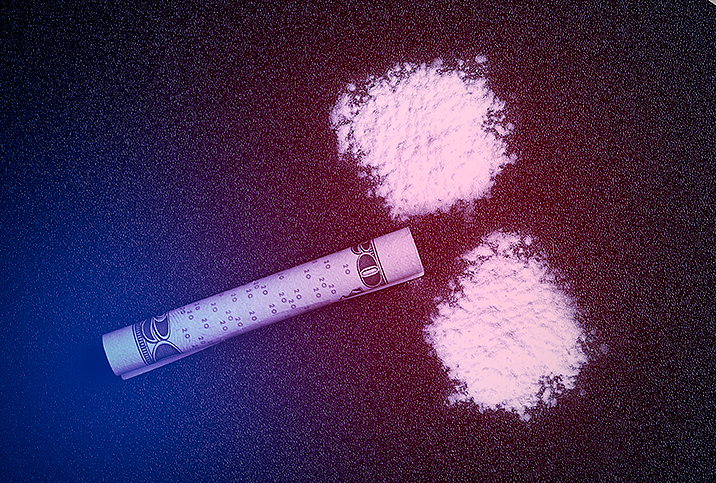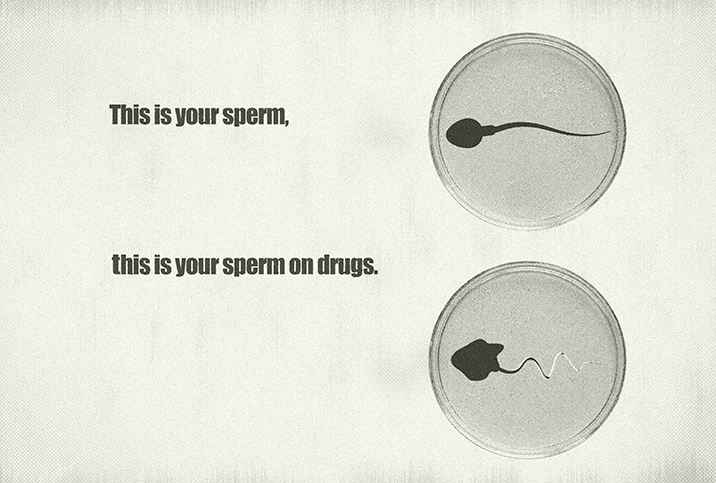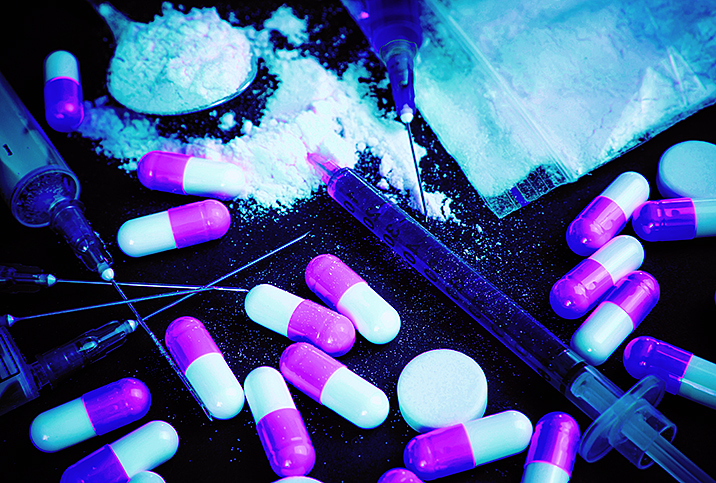The Facts About Narcotics and Sexual Health

Whether you're taking illicit drugs for sex or consistently find yourself having sex while high, you may be disappointed, and even endangered, by what happens when narcotics intertwine with your sex life.
It's bad enough drugs lower your inhibitions, seriously interfering with fully informed consent, but narcotics can also put an enormous damper on your sexual performance and greatly increase your chance of getting a sexually transmitted infection (STI) or experiencing other harm.
Drugs and sexual performance
For some people, certain drugs may be appealing because of their reputation for dramatically increasing sexual desire. In fact, using drugs to enhance sex has become a phenomenon under different names, such as "party-and-play" and "chemsex." However, while some drugs heighten desire, they can also hinder the ability to successfully act on it.
In 2014, the Indian Journal of Psychological Medicine published a review of studies indicating that people who were dependent on heroin, alcohol or opioids experienced sexual dysfunction at rates higher than the general public. In this case, sexual dysfunction included erectile dysfunction, premature or delayed ejaculation and lowered libido in men, as well as dyspareunia (pain during sex) and vaginal dryness in women.
These trends hold true across most drugs, and if the substance doesn't immediately cause problems, it will over time. Chronic abuse of most, if not all, substances has been linked to erectile dysfunction and difficulty achieving orgasm. Less research has been done into the long-term sexual effects of drugs in women, but what has been conducted indicates similar difficulty engaging in and enjoying sex.
Each drug interacts with the body slightly differently, and some carry slightly different risks than others. Let's take a look at some of the most common substances that are abused.
Cocaine
In addition to creating its characteristic high, cocaine can cause an enhanced sense of sexual desire and feelings of euphoria. However, internal chemicals can make having sex a challenge. Because cocaine is a vasoconstrictor, it tightens the blood vessels, impeding proper circulation, including the blood flow necessary for a firm erection. The same effect can keep blood from routing to the vulva and vagina, which can lead to similar issues of a lack of arousal in women.
Methamphetamine
Methamphetamine (meth) is a highly addictive psychostimulant that can lead to increased sexual desire, pleasure and arousal. As with other illicit drugs, meth can lead users to practice risky sexual behavior, like having intercourse with more than one partner and without a condom. This makes users more likely to contract STIs and STDs.
Research on how meth can affect sexual performance is limited to experiments on animals at this point, but there will be more studies in the future.
Opioids
Opioids, such as heroin or prescription painkillers, may initially delay orgasm and ease vaginismus, which may give the appearance of improved sexual performance. However, chronic use decreases the body's available amounts of testosterone and androgens, which in turn decreases sexual desire and increases the occurrence of erectile dysfunction.
A 2014 study published in Spine found men with an opioid prescription for back pain were 50 percent more likely to ask for an ED prescription within six months, and men who had higher doses of opioids experienced ED sooner than those with lower doses. In addition, drugs used to substitute for opioids, particularly methadone, can create similar effects.
MDMA
MDMA (ecstasy) is known to be a pleasure drug, as the nickname suggests, invoking feelings of euphoria, which can cause increased sexual desire. However, MDMA also triggers the production of a chemical called norepinephrine in the body, which can cause erectile dysfunction. Additionally, MDMA is a vasoconstrictor like cocaine, leading to a greater risk of sexual dysfunction in men and women.
Keep in mind MDMA is rarely taken in its pure state—it's typically cut with methamphetamine, anesthetic ketamine (a drug used in anesthesia), caffeine, ephedrine, dextromethorphan and/or even PCP, cocaine and heroin.
Ketamine
Sometimes referred to as Special K, ketamine enhances sexual desire, but as it's also a vasoconstrictor, sexual performance is impaired. Not only that but for people who do manage to have sex while on ketamine, other problems can arise. One staple characteristic of ketamine is it makes users feel less pain, leading them to have rougher-than-normal sex without realizing the damage that might be happening to their body. This can contribute to cuts or scrapes that go unnoticed, and that can increase the chance of transmission for sexually transmitted diseases, notably HIV and hepatitis C.
Consequences of high-risk sexual behavior
The use of illicit drugs can lead to various short- and long-term health problems.
One factor most illicit drugs have in common is they cause users to lose their inhibitions. Sexually, this might manifest as forgoing a condom or sleeping with many people in a short time frame (anywhere from hours to a few months), which can make tracking STIs difficult. If you're in a relationship, lowered inhibitions can lead to infidelity, which may cause a serious problem in your personal life.
Additionally, if any of these substances spark an addiction—and all of them do have tolerance-building effects that necessitate progressively higher doses—you may start to face other physical health problems, not to mention issues at work and in your social life. Users of illegal drugs also run the risk of arrest, prosecution and jail time.
If you or someone you know is struggling with substance abuse, call the Substance Abuse and Mental Health Services Administration treatment referral and information hotline at 1-800-662-HELP(4357). The line operates 24 hours a day, seven days a week, and is completely free and confidential.
Giddy Notice: The use of illicit drugs for recreational purposes is illegal in the United States as described in the Controlled Substances Act, as enforced by the Drug Enforcement Administration. Our medical experts tell us that the recreational use of the drugs mentioned in this article is not only illegal but also extremely detrimental to your mind and body. Giddy in no way promotes or endorses the use of drugs (party drugs, illegal and/or legal drugs) for any illegal or illicit purposes.


















